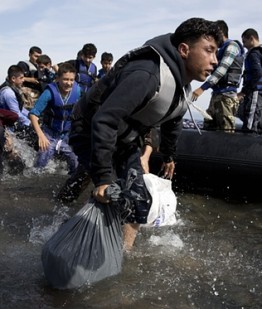People smuggler who ‘transferred thousands to Europe killed in shootout’

An alleged ringleader behind the smuggling of thousands of people from Libya to Europe has been targeted in a shootout, with speculation in Tripoli that foreign agents were behind the attack.
A man known as al-Maskhout was attacked on Friday alongside eight other men in the Tripoli suburb of Furnaj by a four-strong hit squad. The Italian government said he died in the attack, while a relative reportedly insisted he is still alive.
Maskhout is from Zuwara, a coastal city in north-west Libya that has become a hub for the smuggling of tens of thousands of refugees and migrants. He was visiting relatives in the capital during Eid.
A Fornaj resident said the attack took place at 7am, with the attackers arriving in a 4X4 vehicle and rapidly departing after a short blaze of gunfire. According to local media reports, Maskhout was leaving his relatives’ home with his security detail when the attack happened.
Media reports say several men were killed in the attack, and bullets recovered by a pathologist are Hydra-Shok, a specialised round providing deeper penetration, used by western special forces units but not commonly available elsewhere.
Italy’s defence ministry on Saturday denied allegations of involvement, confirming Maskhout’s death but stating Italian agents were not involved. A Nato official said the military alliance was not behind the killings, telling the Guardian it had not carried out any military action in Libya since 2011.
The attack has sent shockwaves across Tripoli, controlled by militia alliance Libya Dawn, which ejected government units from the city last year. Dawn units have since thrown up checkpoints across the city and roving jeeps are patrolling the streets. Until now, smuggling gangs have operated with impunity across western Libya.
The high-profile attack came just a day after the EU’s foreign policy chief, Federica Mogherini, said operations against people smugglers will begin on 7 October.
A British warship will be involved in the aggressive naval operation which is aimed at “boarding, seizing and diverting” boats carrying refugees and migrants in the Mediterranean, the UK’s defence ministry said earlier this month.
Speculation that Europe intends military action against the smugglers comes as the Mediterranean fills with Nato warships for the start of Trident Venture, the alliance’s biggest amphibious exercise in the area for a decade. Naval and air units with 36,000 troops, among them 800 US marines, will on Friday begin holding simulated invasion operations.
Since June, EU naval and air assets, including drones, have been gathering intelligence on the smuggler gangs, intercepting email and mobile phone traffic to build a picture of the smuggler gangs and pinpoint leaders.
Mogherini said the information-gathering is designed to help the “destruction of the business model of the smugglers, the system that they have … to make it physically impossible for these criminal organisations.”
Pressure on EU forces to act is intense, with the numbers of migrants arriving on European shores causing deep political divisions.
Thousands of would-be migrants continue to cross the sea each day, with EU navies last weekend rescuing a record 4,700 off Zuwara.
Profits in the tens of millions of dollars have seen the rise in Libya of a powerful new breed of gangsters, each protected by their own militia. Last month, protests erupted in Zuwara against the smugglers after dozens of bodies of drowned migrants washed up on the beach, but with the rule of law having long since broken down, the trade continues.
Libya’s recognised government, operating in the east of the country, said it had no control over the Libya Dawn militia who hold the capital. An estimated 129,000 people have arrived in Italy by sea from Libya so far this year, with many departing from Zuwara, according to the UN’s refugee agency, UNHCR.
Source: The Guardian